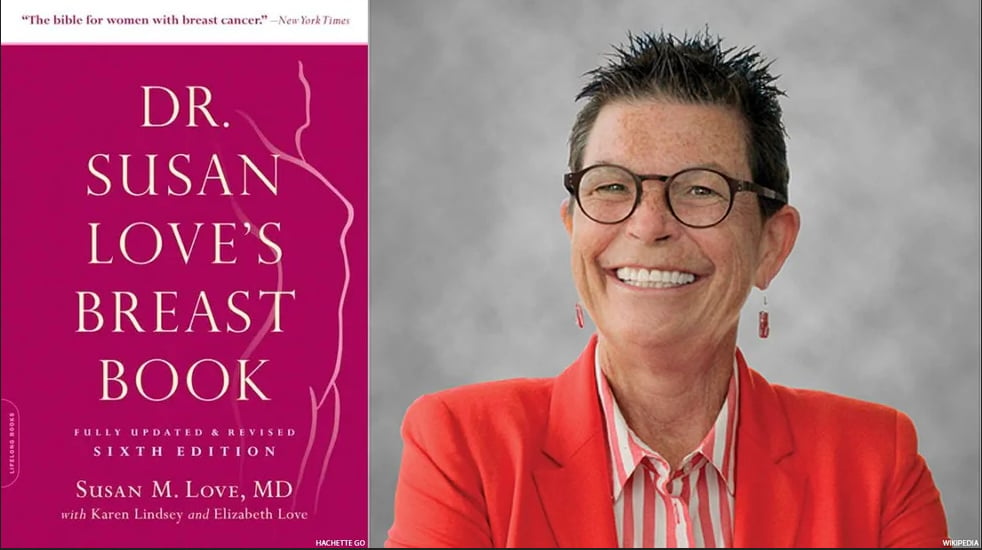
Dr. Susan Love was a physician who took an iconoclastic approach to the detection and treatment of breast cancer. Love was out as a lesbian throughout her high-profile career.
Goodbye 2023, and hello 2024.
Q Voice News takes a look back to remember those we lost this year.
Even though these important people are gone, they will not be forgotten.
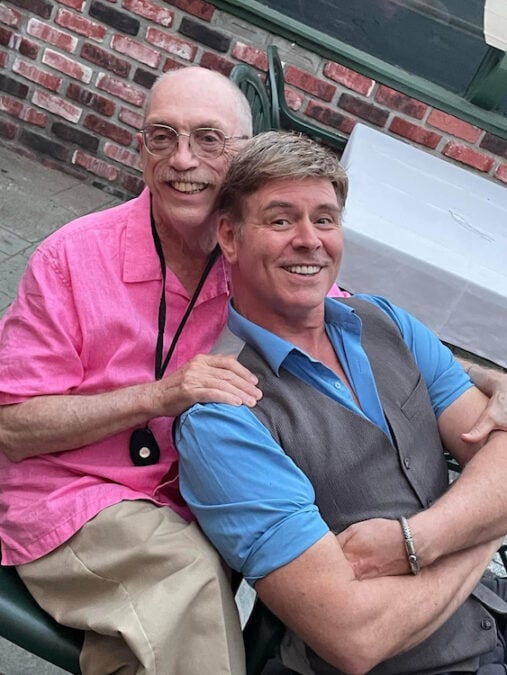
The Rev. Steven Pieters, left, a long-time HIV survivor and activist who became famous when interviewed by televangelist Tammy Faye Bakker in 1985. Pieters is seen with his publicist, B. Harlan Boll. Photo: James Franklin
The Rev. Steven Pieters, a long-time HIV survivor and activist who became famous when interviewed by televangelist Tammy Faye Bakker in 1985. Pieters was a minister and administrator in the Metropolitan Community Church. He was pastor of the MCC in Hartford, Conn., from 1979 to 1982, then moved to Los Angeles, where he eventually became field director for the denomination’s AIDS ministry.
There, he was diagnosed with AIDS and two forms of cancer, lymphoma and Kaposi’s sarcoma.
In 1984 one doctor predicted he would not live to see the next year.
But he did, and in 1985 he became the first patient in a clinical trial of the first anti-HIV drug, Suramin, which sent his cancers into remission. Use of the drug for treatment of HIV and AIDS eventually ceased due to its toxic side effects.
That year also saw his interview with Bakker on “Tammy’s House Party” on the PTL network, which she ran with her husband, Jim Bakker. It came at a time when most evangelical Christian leaders either ignored AIDS or called it divine punishment for being gay. But Tammy Faye Bakker had a more accepting attitude, and “she wanted to be the first televangelist to interview a gay man with AIDS,” Pieters told People in 2021. READ MORE
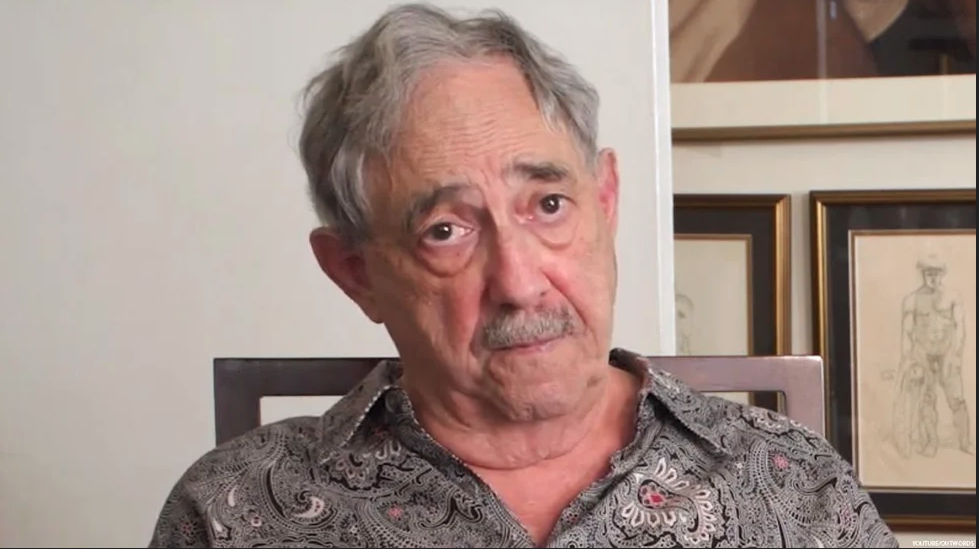
Charles Silverstein helped remove homosexuality from the American Psychiatric Association’s list of mental illnesses and coauthored “The Joy of Gay Sex.”
Charles Silverstein, who helped remove homosexuality from the American Psychiatric Association’s list of mental illnesses and coauthored “The Joy of Gay Sex,” has died at age 87.
Silverstein’s first career was as an elementary school teacher, but in the 1970s he earned a Ph.D. in psychology and opened a private psychotherapy practice.
It was a pivotal decade for him in many ways. In 1973, his presentation helped persuade the APA to remove homosexuality from its Diagnostic and Statistical Manual of Mental Disorders, a landmark decision for gays and lesbians. READ MORE
In the early 1970s, producer Norman Lear, a friend to the LGBTQ community, helped influence a tectonic shift in the representations of gay and lesbian characters on television.
The common, humiliating portrayals were sexual perverts or punchlines to a joke, but Lear challenged those stereotypes when he brought gay men and lesbians into American living rooms.
It’s important to remember that this process didn’t begin with “Will & Grace” or “Glee.”
Lear’s legacy includes the groundbreaking CBS sitcom “All in the Family,” which aired for eight seasons, from Jan. 12, 1971, to April 8, 1979.
“All in the Family” follows the Bunkers, a working-class, white family living in Queens, N.Y. The patriarch is Archie Bunker (Carroll O’Connor), an outspoken bigot and homophobe, who loves to trumpet his opinions of how people should behave and think.
“All in the Family” broke ground in its depiction of issues previously considered taboo for a sitcom, including racism, antisemitism, infidelity, homosexuality, women’s liberation, rape, religion, miscarriages, abortion, breast cancer, the Vietnam War, menopause, and impotence.
“All in the Family” often is regarded by TV critics as one of the greatest TV shows in history. The show became the most watched show during the summer reruns of the first season, and afterwards ranked No. 1 in the ratings from 1971 to 1976.
It became the first television series to top the ratings for five consecutive years.
Here are “All in the Family” episodes that were groundbreaking for LGBTQ representation. READ MORE
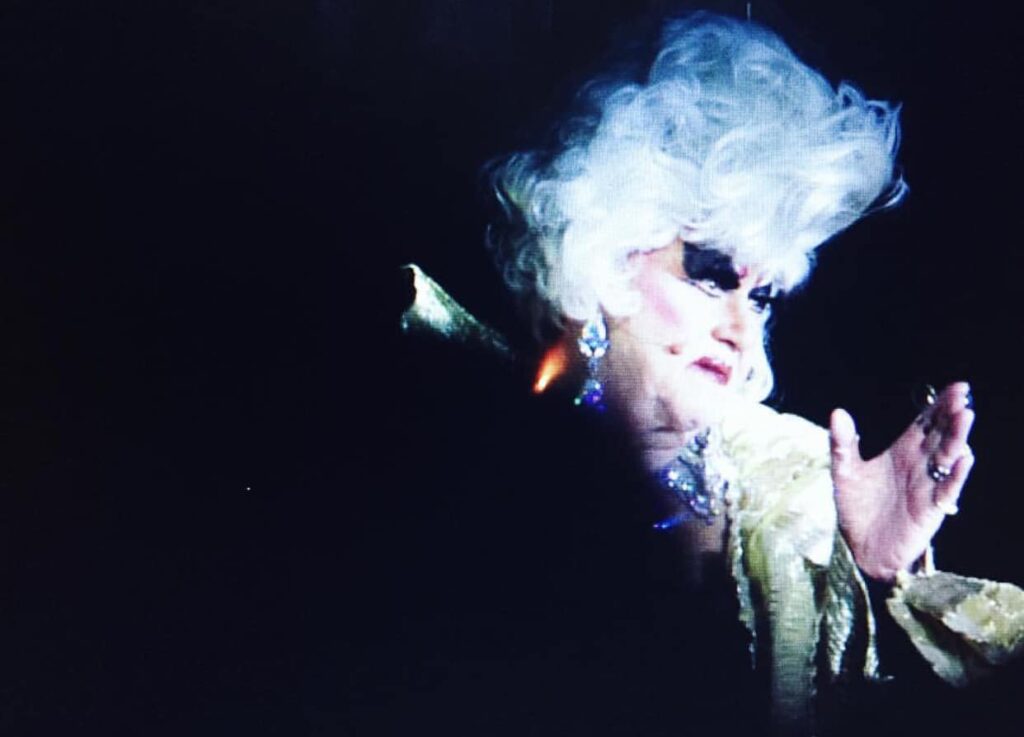
Legendary Darcelle was the oldest known-living drag queen.
For more than 50 years, Darcelle ran the Portland nightclub Darcelle XV Showplace, “where the entertainer told bawdy jokes in elaborate makeup and beaded gowns, while acting as master of ceremonies to a parade of other drag queens and dancers,” The Oregonian reports.
It’s the longest-running drag club west of the Mississippi.
Darcelle was embraced warmly by Portlanders, appearing at many events around the city and receiving numerous awards.
The queen received a place in “Guinness World Records” in 2016 as the world’s oldest drag performer. READ MORE
Tony Award-winning comedian Barry Humphries was internationally renowned for his garish stage persona Dame Edna Everage, a condescending and thinly-veiled snob. Edna, who was enormously popular with the gay community, was best known for her catchphrase, “Hello, Possums!,” her lavender hair, and rhinestone glasses.
Humphries won a Tony Award in 2000 for his Broadway show “Dame Edna: The Royal Tour.”
The character began as a dowdy Mrs. Norm Everage, who first appeared on stage in Humphries’ hometown of Melbourne in the mid 1950s. READ MORE
Charles “Chuck” R. Williams, the founder and namesake of the Williams Institute at the UCLA School of Law, the LGBTQ+ think tank. In 2001, Williams, Bill Rubenstein, Brad Sears, and UCLA law scholars were the minds that helped create The Williams Project. Williams’ $2.5 million donation to the UCLA Law School established the organization.
At the time, no college or university had ever received such a gift to support a gay or lesbian academic program.
In 2006, the Williams Project merged with the Institute of Gay & Lesbian Strategic Studies to become the Williams Institute.
The Williams Institute conducts rigorous, independent research on sexual orientation and gender identity law and policy. Their mission was to counter the pervasive bias of law, policy, and culture against LGBTQ+ people.
Williams gave more than $20 million to support the institute. His vision was to create an organization to level the playing field for LGBTQ+ people under the law. READ MORE
Gay filmmaker and author Kenneth Anger was known for his experimental and homoerotic movies and his wildly gossipy “Hollywood Babylon” books.
In 2006, Anger received the Outfest Achievement Award for his undeniably influential works in LGBTQ+ film, such as 1947’s “Fireworks” and 1963’s “Scorpio Rising.”
Anger, sometimes called the godfather of queer film, grew up in the Los Angeles area and began making movies in his youth. He was 20 when he made “Fireworks,” shot in his parents’ Beverly Hills home when they were out of town.
Anger appears in the 14-minute film having “a sadomasochistic encounter with a group of musclebound sailors, one of whom undoes his pants to reveal a Roman candle,” as The New York Times describes the movie in its Anger obituary.
“Fireworks” “was a daring exploration of gay desire,” The Washington Post notes, and film scholar Ryan Powell has called it “arguably the highest profile homoerotic film of the postwar years.”
His most famous film, 1963’s “Scorpio Rising,” follows the adventures of a group of leather-jacketed motorcyclists as they ride and party. It “alternately treated the motorcyclists as sex symbols, neo-Nazis and would-be messiahs, intercutting footage from a Christian educational film about Jesus,” according to the Post. Anger said the movie was a documentary using real bikers. READ MORE
Dr. Susan Love was a physician who took an iconoclastic approach to the detection and treatment of breast cancer.
Love, an out as a lesbian throughout her high-profile career, was skeptical about mastectomy — the removal of a breast — as a cancer treatment, saying that whenever possible, surgeons should remove only the cancerous lump and follow up with radiation.
“Wanting to keep your breast is not about vanity,” Love once said. “It’s about being intact as a person.”
Love questioned the value of mammograms for young women, as their dense breast tissue makes it hard to detect cancer through that exam. She recommended that women wait until age 50 to undergo annual mammograms, but most medical authorities still urge that women start at age 40.
Beginning in the 1990s, Love expressed doubts about the benefits of hormone replacement therapy to treat the effects of menopause. READ MORE
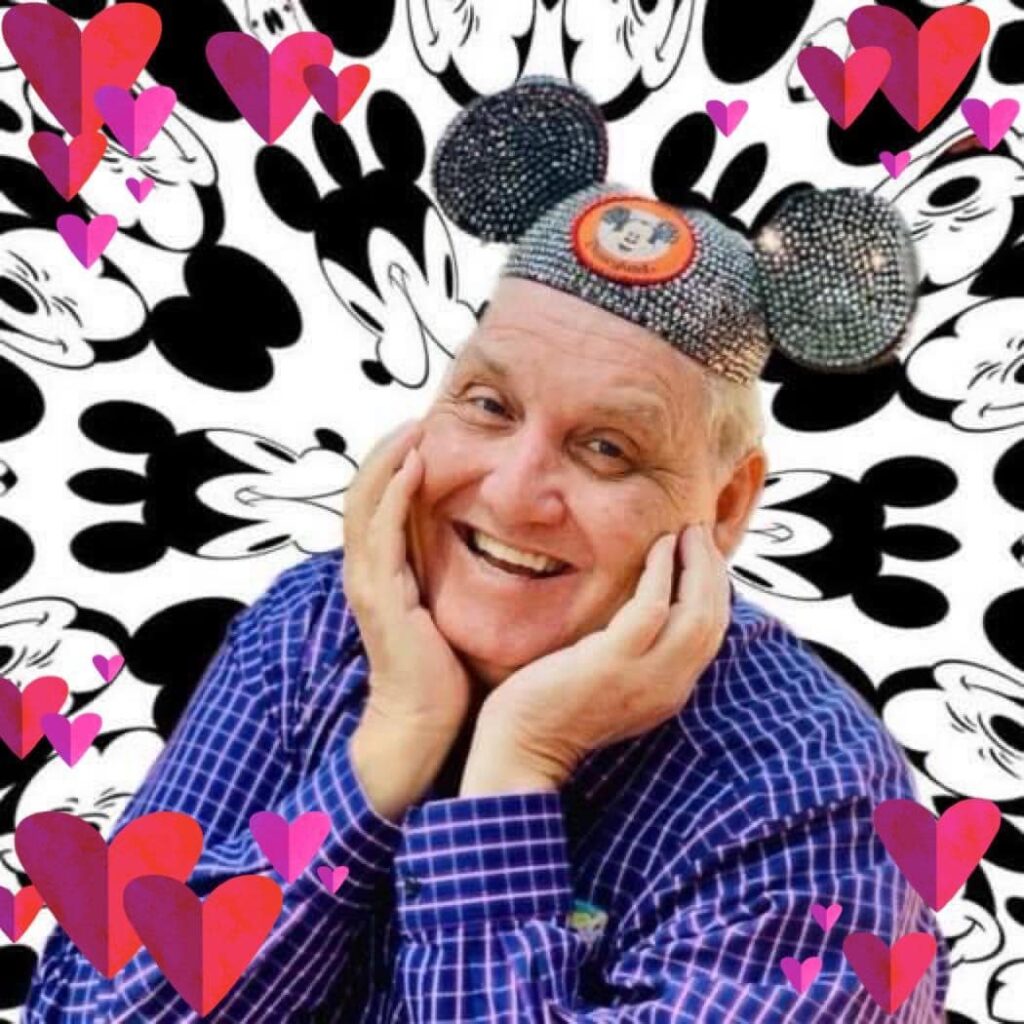
On social media, Worthie Paul Meacham posted many photos of his Disneyland adventures. It was his favorite place on Earth, he said. Meacham was known as the iconic bawdy and buxom drag queen Momma. Photo: Worthie Paul Meacham/Facebook
Worthie Paul Meacham was known as the iconic bawdy and buxom drag queen Momma.
Meacham’s beloved Momma was born in July 1994 during Silver Lake’s Dragstrip 66 at the “Muscle Beach Bikini Party.” He called himself a late bloomer to the drag scene during an interview with LA Weekly.
“To be honest, it was not an easy start,” said Meacham, who grew up in Hermosa Beach. “I had a late bloom with my life in drag. I came from a very strict religious background. I was not at the gay clubs or bars or even out with my sexuality until way after my 20s had passed. I was scared I would go to hell.”
Momma was a huge part of the Dragstrip 66 family and performed almost every month for several years.
Momma was big and bawdy and larger than life, very much cut from the old Hollywood glamour. In the early 2000s, Meacham also worked the perfect drag job, managing the Bob Mackie warehouse, EC2 Costumes.
During the early 2000s, Momma’s popularity from her Hollywood drag career was strong. She appeared at Dragstrip 66, Rage and Makeup and expanded her performances into Orange County.
Momma hosted the monthly gay event Club Lucky at the House of Blues Anaheim in the Downtown Disney District, which was adjacent to her favorite place on Earth. On social media, Meacham posted many photos of his Disneyland adventures. READ MORE
Film director William Friedkin, best known for “The French Connection” and “The Exorcist,” directed two high-profile and controversial gay-themed movies — “The Boys in the Band” and “Cruising.”
Both have received some condemnation of how they portrayed gay and bisexual men, but both have also been reevaluated in recent years.
“The Boys in the Band” came out in 1970, two years after the Mart Crowley play it was based on premiered off-Broadway; Crowley also wrote the screenplay. The film starred all the actors who originated the roles onstage.
It depicts a group of New York City gay and bisexual friends meeting for a birthday party for one of their number. They drink excessively, use recreational drugs, and snipe at each other. Friedkin, who was straight, once claimed to have been cruised by a gay man on Fire Island, which he was visiting as research for doing the film, and “getting out of there as quickly as my legs would take me,” according to a 1980 article by Edward Guthmann in the journal Cinéaste.
The play and the film were criticized at the time — and later — for portraying queer men as dysfunctional and self-loathing. The objections were mainly to the source material, not Friedkin’s direction. READ MORE
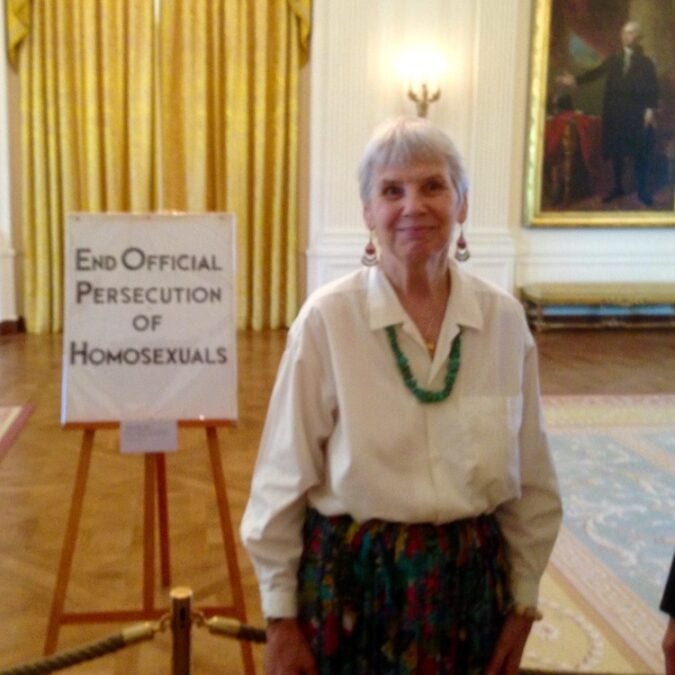
Lilli Vincenz was a pioneering activist in the LGBTQ+ rights movement since the early 1960s. Vincenz is seen at a White House Pride gathering in June 2014, where, in the East Room, she is photographed with one of her picket signs used in a 1965 protest at The White House. Photo: Bob Witeck
Lilli Vincenz was a pioneering activist in the LGBTQ+ rights movement in the early 1960s.
Vincenz became active in the movement after being outed as a lesbian in 1963, while she was serving in the Women’s Army Corps., and was discharged.
She soon joined the Washington, D.C., chapter of the Mattachine Society, becoming the first known lesbian in that gay rights group..
In 1965, she joined its cofounder Frank Kameny and eight others in the first protest at the White House for equal rights for gays, lesbians, and bisexuals.
Vincenz was the only lesbian marching.
“Sometime(s) you are the only person who can do something at a certain time,” Vincenz once said. “It’s the old question, ‘If not I, who?’”
Vincenz participated in protests at other high-profile sites, including the Pentagon, Independence Hall in Philadelphia, and the U.S. Civil Service Commission’s headquarters in D.C.
She filmed the 1968 Independence Hall protest, and used her filmmaking skills to document other events in the burgeoning movement, such as the first gay rights march in New York City. It was held in 1970 to mark the first anniversary of the Stonewall riots.
Vincenz donated her films and papers to the Library of Congress in 2013, and her films can be viewed on its website. Vincenz’s admirers felt the acquisition was a long-awaited recognition of her importance in the gay rights movement. READ MORE
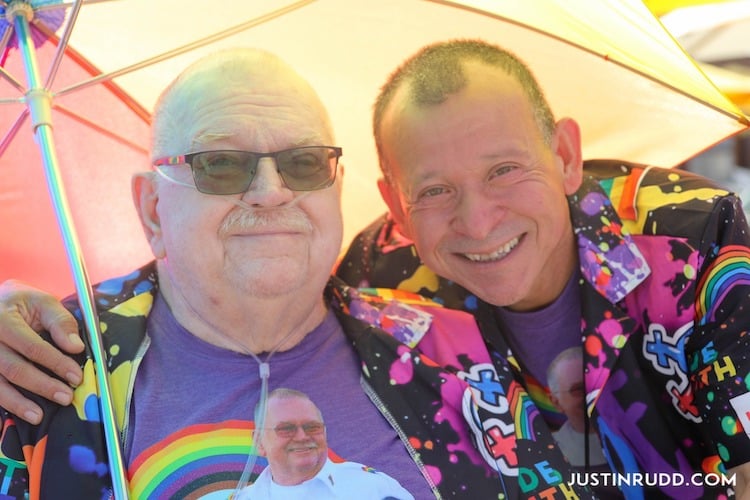
Bob Crow, left, and his husband, Tony Almeida-Crow, participate in the Long Beach Pride Parade on Aug. 6.
Bob Crow went from a flower shop employee in an Alabama small town to a cofounder of Long Beach Pride.
Crow, who made his last public appearance at the Long Beach Pride Parade in August, was diagnosed with stage four cancer last year.
Crow, along with Judith Doyle and Marylin Barlow, founded Long Beach Lesbian & Gay Pride Inc. in 1983. The nonprofit then organized the city’s inaugural Pride Parade & Festival in 1984.
Over the past 40 years, Long Beach Pride has become one of the largest and most popular LGBTQ Pride celebrations in the nation, though its popularity has waned in the past couple of years.
The Long Beach Pride nonprofit celebrated its 40th anniversary this year.
Crow was the last surviving founder of Long Beach Pride. Barlow died in 2015 and Doyle died in 2022.
Crow is credited with helping pave the way for generations to express their authentic selves. READ MORE
